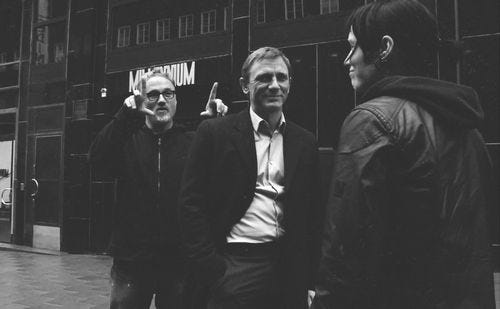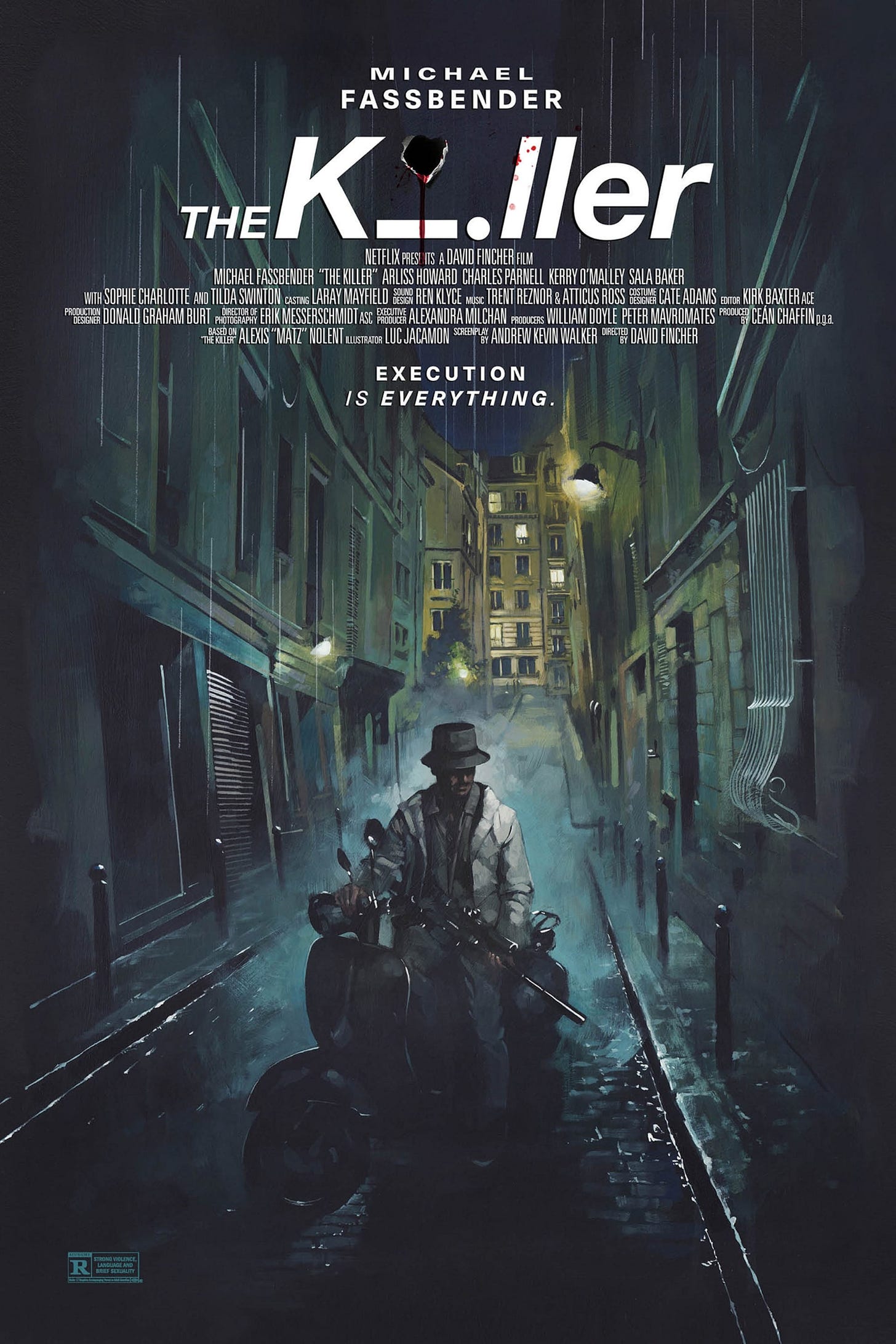After a month spent looking back over some fun, challenging, and strangely delightful horror movies of the past, I wanted to shift attention on this space to something outside of that genre and look at a more recent film. Something new that I can honestly recommend and that you (thanks for being here by the way) will have little trouble throwing on this week, if you’re so inclined. Something to pass the time between servings of stuffing and pie and the energy required to nimbly avoid pretty much every conversation topic except: what have you been watching lately?
Lucky for us, David Fincher just released his first film in 3 years, and his first in 9 years that really feels like a Fincher film. That’s not a jab at Mank - 2020’s blustery, black and white period biopic of Citizen Kane scribe Herman J. Mankowitz - but it is recognition that audiences have, after 30 years and 12 feature films, come to expect certain things from this meticulous director. Things like sudden bursts of ultraviolence, muted but sinister color palettes, painstakingly choreographed camera movements, and a general sense of nihilism with small but glinting veins of hope and redemption. All the juicy stuff that makes Fincher stand apart and earn his reputation as one of the most influential filmmakers of our time, not to mention the director working now who perhaps most embodies the moniker of control freak.
Emphasis on control. Second emphasis on freak.
And that’s no jab either. In fact I think it's this combination - the perverse flair of Fincher’s films coupled with his almost surgical execution - that makes him one of my favorite filmmakers. A director whose output I personally think contains some of the most rewatchable films ever made.
That’s maybe a strange thing to write about a director who delves so deeply and so often into dark territory. These stories center on serial killers and home invaders, outcasts and degenerates, self-righteous incels and vindictive vigilantes. But those aren’t the things that I think really tie his films together or that make them almost impossible to look away from, like a car crash in balletic slow motion. There’s a distinct and overwhelming obsessiveness not only to these characters but to the means by which they are portrayed. And that obsessiveness is incredibly contagious.
I’m sometimes puzzled by the fact I feel the need to revisit the sterile boardrooms and dry banter of The Social Network time after time. Or how I keep coming back to Zodiac though it so thoroughly disturbs me (and contains what I consider to be the scariest scene in any film, horror included). Why do I feel so cozy spending time with Lisbeth and Mikaell in a bitterly cold Swedish cottage looking over old photos of grizzly murders and why does the beach read propulsion of Gone Girl feel like a strangely narcotic lullaby at the end of a difficult day?
It’s not that I’m attracted to the grim and grime these stories portray (well, not only that). It’s the specificity and obsessiveness that touches every corner of Fincher’s films. The brain-teaser plotting. The unflinching and inhuman eye of the camera. The keenly self-aware casting and, increasingly, the Reznor/Ross scores worming their way into my subconscious. The fact that you can feel intention in every light and shadow, motivating every word and motion. It’s the freakiness, sure. But it’s also the control Fincher exerts over his films that makes them perennial visitors to my screen.
When compared to the films I’ve listed above, Ficnher’s latest, The Killer, seems incredibly conventional. At least at first blush. It sure looks like a Fincher film - those cold blues and soft yellows, that score, that acidic voice over, those moments of tense protracted silence, sudden twists of cruelty, and that signature undercurrent of menace. But people have noted that this one seems to be missing the heft of his best, and plenty are hastily labeling it minor work from the director. An exercise in genre. A tightly constructed and well executed film that seems almost proud to announce itself as a lesser child to greater siblings. Just a movie. Nothing more.
And as “just a movie” The Killer absolutely delivers. It hits all the marks one hopes and expects from an assassin film: far-flung scenic destinations, single scene drop ins from great character actors, process montages that carry us from preparation to clean up, quick getaways, not to mention the hands down best fight scene of the year (sorry, John Wick). It’s got all the necessary ingredients, and doesn’t skimp on the flavors we’ve been conditioned to crave.
For the first half hour or so, I was happy with what I was getting, but I was also a little deflated. Parched for something more. I was sitting there enjoying the smooth and methodical visual language, the trope-laden monologuing, the familiar colors and sounds and feelings… and I was thinking to myself “is that all there is?”
But that all changed when the killer pulled the trigger.
I’ve seen this film twice now. In theaters (at my beloved Nitehawk in Brooklyn, which I wrote about last month) and at home on Netflix (where almost everyone will see it) and I think this immediate appearance of conventionality, this facade of the familiar, is all part of the trick this film is playing. Because from the first lines Fincher and his long-time collaborator screenwriter Andrew Kevin Walker seem to be telling us one thing with complete, razor-sharp clarity:
This guy is full of shit.
(I’m going to get into spoilers now, so if you haven’t seen the film yet, I recommend you do before reading further).
The first 20 minutes or so of this movie are like a perfectly crafted joke. We hear all about this guy’s philosophy of emotionlessness. How he insists on solitude, labels joy and indulgence as distractions and poisons, waxes semi-poetic on his disdain for other people and his pride in himself. Watching from without a man with purpose, a man with a code, a man who gets the job done.
Then he fucks it all up.
We’re waiting for a trigger to be pulled - waiting so long we begin to squirm - and when it finally is pulled, the killer misses his shot. The film could have ended there. Been a perfect little short story about the lies we tell ourselves. About the myth-making we do to feel like our identity and our profession (which are in this case inextricably tied) actually matters and makes us unique.
When he misses his shot, the camera moves from ultra-smooth ghost to messy hand-held (a move that feels like Fincher actively surrendering his own control , and in the process bringing us closer to the experience of the killer). A subtle shift that seems to announce this piece as at least semi-autobiographical, or at a minimum self-aware. It’s a subtler satire than the in your face satire of Fight Club, and a sign that Fincher is just as interested as ever in the lies we tell, to the world and to ourselves, as he builds a rollicking portrait of a control freak who is freaking out because he just realized the truth: there’s no such thing as total control.
The Killer is an assassin thriller and a send up of assassin thrillers. Both at once. And that twin feeling of genre competence and comic irony runs through everything that follows, as his precious code not only unravels but is proven to be a whole bunch of flimsy rationalizing. He’s not emotionless, he’s in love. His body isn’t a temple, it’s a garbage can. This emotionless killing machine listens exclusively to The Smiths, for crying out loud. A band that exudes longing, uncertainty, and melodrama. His aim is almost always off, and though he is resourceful and does find his way out of almost every situation, often narrowly, his control over any situation is tenuous at best.
Whether or not you think that’s funny, or even true, will probably influence your opinion of this film as something biting and subversive or just plain typical. If you’re in the typical camp, you’re not wrong. Fincher is working, specifically and intentionally, with a familiar archetype. He’s done this before - breaking down the populist dynamic of a harried detective and his young upstart partner or a mother protecting her child from nefarious invaders. But just because he’s drawn to types doesn’t mean that they aren’t unique variations on familiar themes. You might have met your fair share of disgruntled spouses or anti-social hackers, but you don’t run into Amy Dunne or A Lisbeth Salander every day (though Zuckerbergs are becoming all too common). Michael Fassbender’s nameless killer is no different. He’s a type, and seems proud to be. He leans hard into the lifestyle, the styled anonymity, the stiff upper lip self-discipline, the rigid code of the predator he believes himself to be. He is a character trying desperately to be a character. And it’s working, kind of. His self delusions prove, time and time again, just buoyant enough to keep him afloat.
The most potent of these delusions is that the killer - this self-styled lone wolf, this modern day samurai - is anything but a free agent. He subsists on Mcdonalds for protein and Starbucks for caffeine. He sleeps and works out of a WeWork (vacant but still receiving its mail). He’s abetted in his schemes by quick trips to Home Depot, rental car companies, and overnight deliveries courtesy of Amazon. He’s so much a part of the system he professes to skirt that he actually allows “the client” - the stock market gremlin with the penthouse apartment and the douchebag beanie (a creature that feels like a direct descendent of the world the characters of The Social Network envisioned) - to get away without a scratch, while poor Leo rots in his cab and Dolores’ family collects her insurance. And this might feel deflating, but it’s also incredibly true. Those guys never get away. We know that. We hate that. We still buy things on amazon, order our nitro cold brews to go, and throw on whatever Netflix tells us to pass the time and feel a part of the world outside our own, calculating minds (Netflix’s The Killer now streaming).
The killer won’t topple the system. He’s too much a part of it. And that is perhaps the ultimate irony of this film. That he isn’t special. He isn’t one of the few (if those few even exist). He’s one of the many. Just like us. A mistake maker. A consumer. Fallible. To quote The Smiths: he is human and he needs to be loved. Just like everybody else does.
…Or maybe I’m reading too deeply into this one. I’d have to check. Maybe I’ll throw it on again tonight. See what’s there (or not there) that I might have missed.










